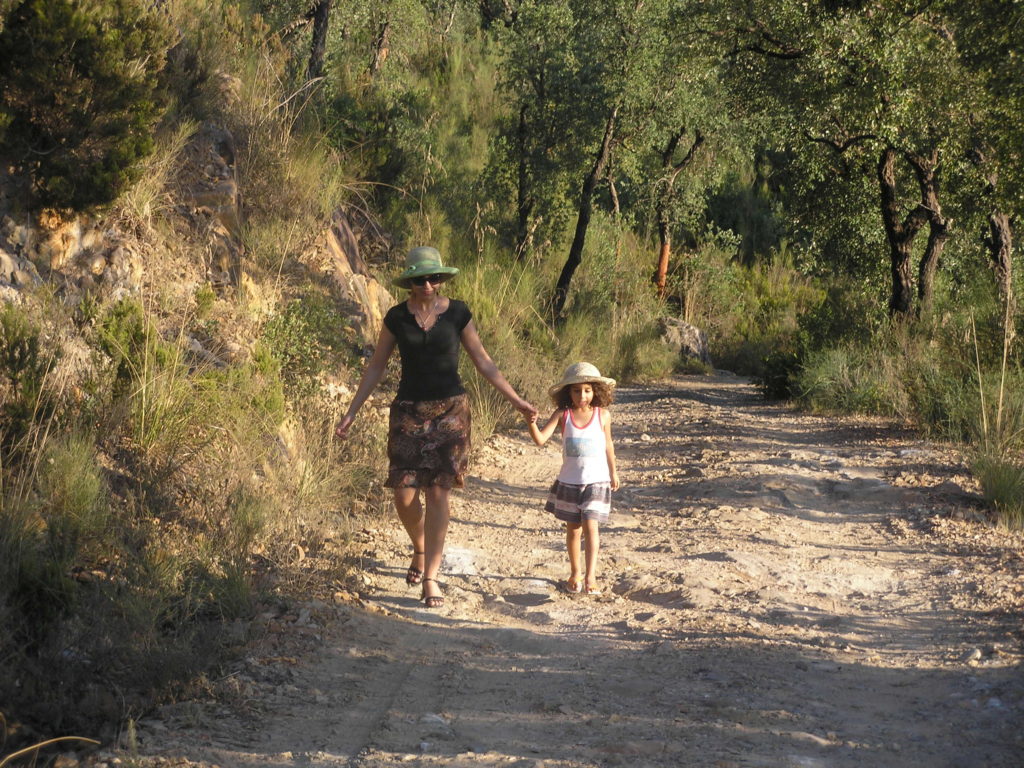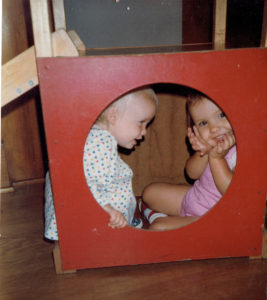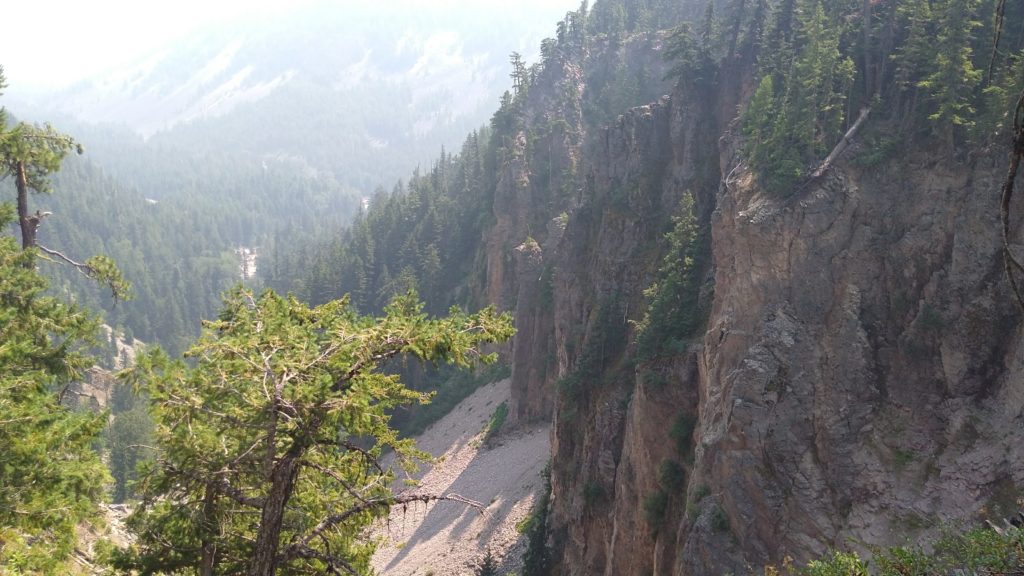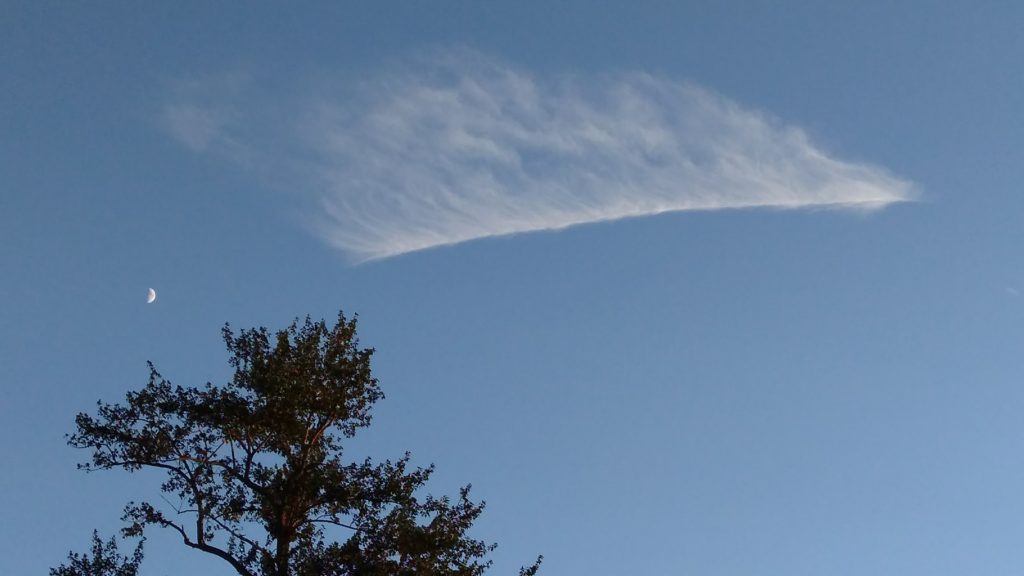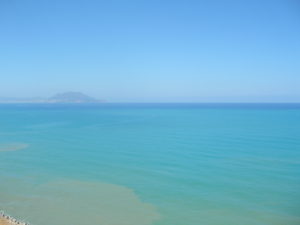
Death is an opening. It can break the hearts of those left behind. When the heart is truly broken, it stays open. Then there is no difference between one and the other one. Sometimes it is our own heart that is smashed. Sometimes we are the observer of the annihilation, the one standing by to represent life. There are places in the world where this breaking of the heart is still truly honored.
Sometime on Monday of last week, my son-in-law’s deeply cherished mother died in Tichy, Algeria, a small coastal town of the Kabyle region. Although she had been very ill for many years, she had lived on in their family home, the beating heart of a family of great dimensions, living both near and far.
My son-in-law was the child who had reluctantly ventured furthest, of necessity. He is the youngest son. Each year he traveled back to see her and his family, no matter the obstacles. Each weekend, there are hours spent on Skype, talking with family in France and, when their internet is working, in Algeria. Their conversations are woven into the mornings spent at home, keeping company as naturally as if they were in the room together.
Family for him is the core of everything, whether they grapple and disagree or act as best of friends. His plan had been to leave for his annual trip at the end of this week. Suddenly on that Saturday, he began getting calls from his siblings in the middle of the night. His mother had had some sort of medical crisis. It was hard for my daughter to piece together exactly what had happened from the flurries of intense conversation mostly in Kabyle, partially in French.
By Sunday night he could no longer sleep. He was trying to figure out how to get there quickly. His American passport was still at the Algerian Embassy in New York with an application for the visa he needed. His Algerian Passport had just expired. Calls were going back and forth across the huge expanse of geography. Nothing was clear. Then Monday early in the morning the call came amidst wailing and crying. His mother had died.
He was beside himself. I received the call at 5 am. “I’ll come right away,” was the only possible response.
Good fortune allowed me to drive in the one crack in the streams of morning traffic going from my place in the country towards the city. I was able to get to their apartment in Seattle before the crushing morning rush hour. My daughter, hugely pregnant, was already deeply absorbed in the process of trying to book a ticket to get him there the next day. My four-year-old granddaughter was playing quietly on the floor.
The funeral had to be held before the end of the second day. The family would be gathered at the house, grieving there together the entire day. The body would have to be buried before they slept. My daughter had already been on Skype pleading with his brother to postpone it one day. He couldn’t do it.
The only flight that would connect with Algeria on time to get him there left around 2 pm that day. It was now almost nine in the morning. She had already been working with a friend of his at the Algerian Embassy in New York to figure out whether the passport had already been sent. She had booked tickets the day before to New York so he could pick up his passport and visa at the embassy and then travel from there.
Now it appeared the visa had been sent on Friday by two-day mail. What time it would arrive was the mystery. Without the answer to this question, she couldn’t book the ticket. The friend at the embassy was able to get us the tracking number. It appeared it was at the local post-office, waiting to go out. If it were delivered with the regular mail, it wouldn’t arrive before the flight. I would go to the post-office just as it was opening and try to intercept it.
There I was, in the parking lot of the local post-office. A uniformed carrier was walking past me, on some final errand before leaving for the day. I called out to him,
“Can you help me?”
I hurriedly explained the situation, imploring—the sudden death in the family overseas, the passport and visa being sent from New York, the emergency.
“How can I catch the carrier who delivers to their address?”
Sweetly, he had stopped, packages in arms, to listen. He tsk-ed sympathetically and said the carriers hadn’t left yet. He motioned to the building and suggested I go in and talk to the people behind the desk and see if they could help.
I dashed in the front door. There was already a small line of three or four people and two staff behind the desk. My ancestral mother, born and bred in Brooklyn, was coaching me through from beyond the grave. I called out to the staff, brazenly,
“Can you help me catch a carrier before he leaves? I have an emergency. A passport. A death in the family overseas. Please?”
The woman behind the counter asked what I wanted them to do. Loudly I replied,
“I’m hoping we can intercept it before it leaves the building. If it gets delivered with the regular mail it will arrive too late to make the flight.”
She pointed to the people waiting and said, with finality,
“We have to take care of them first. Then we’ll try to help you.”
The two people at the front of the line pointedly tried not to look at either me or the woman behind the counter. The man, forth in position, called out,
“Can’t you just help her?” and turned to me to say,
“The post-office! How hard they make things!” but made no move to step aside to let me go in front of him.
After waiting while one woman spent time telling the clerk a long story about a lost item of mail in an empty envelope someone had picked up on the street and brought to her, complete with commentary about the effrontery of certain people, after which the clerk disappeared into the wilds of the mail room behind her and while a man picked out the kind of stamps he wanted from two different batches the clerk put out on the desk, it was finally my turn.
She pretended to know nothing about what I wanted. I began my plea again from the beginning, patiently, calmly. She said,
“Well, is the package addressed to you?”
I said no, but I could have my daughter come with ID in moments if she found it. She looked extremely dubious. I gave her the tracking number my daughter had texted me and she insisted on looking it up again, although I had told her the system already had indicated it had arrived at the post-office. After much checking and re-checking and disappearances into the mail room, she told me that it had not, in fact, arrived yet, but was on its way. Since it was two-day delivery. It would go out as soon as it arrived. She had no idea when and the manager wouldn’t either.
Desperately, I called my daughter who had been on the phone to the central post-office number. They had insisted it had already arrived in the building and the manager would be the only one able to handle the situation.
I went back into the building, calling out once again that a central manager said it was in the building. Disgustedly, the woman behind the desk pointed a finger to the back of the line. This time I waited just a minute or two. The other clerk, a man, had the first opening. Although he could not have helped but hear the whole story as it unfolded, he, too, acted as if he had been in a sound proof bubble.
“How can I help you?” he asked.
Starting again from the beginning, I added the bit about the central manager and firmly asked to see their internal manager. He replied, “I’m the only one who is authorized to do this here. I’ll go check. The system still says it hasn’t yet arrived.”
Then he disappeared for a long interval.
Meanwhile, my daughter called again.
“It just arrived at our door! I don’t know how, but it’s here!”
“The passport?” I asked. “The visa?”
“Yes, yes!”
“You’re sure?”
“Yes, yes, I have them here in my hand.”
“Buy the ticket!” I said. “I’ll be back in ten minutes!”
I stood, peering into the back where I could see tables and cubbies in the mail room, and called out once
“Hello!”
Nothing. I turned to the women, still behind the desk. She shrugged.
Suddenly, he reappeared. Shaking his head.
“Just as I thought. Not here yet.”
Before he was finished, I was already shaking my own head and saying,
“It just was delivered to their door. Don’t know. Must be a miracle! Thanks! Bye!”
I pocketed my cell phone and dashed out the door, crossed the street and jumped into my car.
That was just the beginning. For another hour or so, my daughter and I compared flight paths from Paris and Amsterdam, Marseille and Lyon, arriving in Algiers or Bejaia. She spoke several times in the process to her brother and sister-in-law in France. Once to her brother-in-law in Tichy, Algeria. All in the slightly accented French of the Kabyle. Politely and patiently, she spoke to airlines and booked, canceled and re-booked tickets while my son-in-law spoke in Kabyle to his brothers in Algeria, eyes streaming, periodically rising to go to the balcony and smoke. Their four-year-old daughter somehow played quietly and happily in the midst of it all, going every once in a while to hug her father’s leg.
By the time we had the right combination all ready to go it was time. The process of getting everything together and getting out the door, usually a long one, happened quickly. Four-year-old shoes on, ready, passport, visa, keys, phones, ticket numbers, bag, all in the car. He, knowing the streets best, was able, even after several sleepless nights, to be his usual self long enough to drive. Somehow missing the exit at the last moment, we re-grouped quickly and lost only a few precious minutes.
We found parking, got everything together and made our way to the ticketing area, running where we could. There was, of course, some problem with getting the boarding pass at the machine, but my daughter somehow worked it through while I entertained my grand-daughter and kept my son-in-law from wandering off in search of a place to smoke.
Then the mad dash to the security lines. We were cutting it close. Too close. My daughter went off to find a security guard. When she returned, a uniformed man was following her. We ducked under the guide ropes and followed him at a run, me with grand-daughter on hip. He guided us under other ropes near the front, explaining briefly to the people waiting and moved us to the place where a guard was checking passports in front of the security machines.
Two families stood ahead of us, passports open, expectantly. My daughter asked the guard if her husband could be checked next. He indicated the people in front of us with a slight nod. She turned to them,
“His mother just died. He has to get on this plane to make the funeral. Please!”
After a moment’s hesitation, wife and husband exchanging a quick questioning glance, they made way for him, bowing their heads and gesturing.
My daughter and grand-daughter embraced my son-in-law, his daughter saying,
“Daddy I’ll miss you, but you’ll be with your family. I love you. They love you too.”
We all cried.
His passport checked, he moved into the security lines. Before he vanished on the other side of the TSA machines, he turned and waved. His plane was already boarding, moments to spare. My daughter called him to make sure he was heading directly to the plane, not distracted by his pressing need for a cigarette in the midst of all his sorrow and worry.
We drove back to their apartment, picked up the pieces, canceling tickets booked and now not needed, going on with the day of a four-year-old. There were calls to his brothers and sister-in-law to update plans. There were intimate moments sharing the grief my daughter had had to hold in check–memories of the time months she had spent in Tichy helping take care of his mom, the visits since–her beauty, her goodness, her wisdom.
It seemed he would be able to meet his brother, who was flying from France, at the airport in Algiers. From there they would take a taxi across the desert, infamous for its bandits, to the shores of the Mediterranean at the foot of the purple Atlas Mountains, to their small town, their parental home, to join their family of eight other siblings and countless grandchildren, cousins, uncles and aunts all in the throes of grief for this woman who had been the heart of it all.
We slept finally, at first a sleep of real repose after a seemingly impossible task was completed. In the middle of the night, I was awakened by the sound of a cell phone in my daughter’s room and the beginning of a conversation. She emerged, my grand-daughter miraculously still asleep.
It was two am and he was finally at the airport in Amsterdam, his plane from Seattle somehow having been delayed by four hours. The computers at the service desks at the airport were not operating well. He had to someone re-book his connections to arrive by the end of the day in Tichy. They were trying to get him booked on a flight to Marseille that would get him into Algiers in the evening. From there, it would be impossible to get to Tichy on time for the burial, but it seemed to be the only option. He had reconciled himself to the fact that his mother knew he was doing all he could to get to her. If he could not make it, she would understand.
We started up our computers. After several calls to agents of Air Algerie in France, who were used to the fact that it was mostly impossible to book tickets through their website, we were able to purchase him the ticket from Marseille to Algiers. He called back. He was booked to Marseille, but the flight was going to be late. He wouldn’t make the connection. The agents at the airport were trying to find other connections but their computers were still giving them trouble.
My daughter and I, with dueling laptops, set about finding all the various routes from Amsterdam to connecting cities and on to Bejaia or Algiers. After being on the verge of giving up several times, I found a link through Lyon to Bejaia that would actually get him there in the early evening, about a half-hour’s drive from his family home.
Madly, he worked with the agents there and we on our computers to book the tickets. Just as we had completed the purchase, the agents there told him he didn’t have enough time to make the connection in Lyon. We despaired. Back to the computers. Was there something to Algiers we’d missed? Would he just have to get there the next day and miss the funeral entirely?
After about a half an hour, he called again. They thought he could make it. He was boarding the plane to Lyon. My daughter and I embraced. Maybe he really was going to get there on time. She called his brother in Tichy where people were keening and wailing in the background. They would be able to postpone the burial until he arrived if there were no other delays. She called his sister-in-law in France with the change of plans. We embraced and went back to our beds for a short hour or two.
In the morning, we had not heard from him. My daughter, after several calls, discovered that he had made it to the house just in time to see his mother’s body. His brother from France had arrived at almost the same time. The grand-daughter who was left at the house confirmed they had all gone to the burial in the mountains just above the house. They were returning the body to the place where her life had begun, tending goats in view of the endless expanse of the turquoise sea.
Connections to Algeria can be very spotty. Internet service is sometimes available, sometimes not. My daughter wasn’t able to contact him for several hours. We spent the time canceling flights, buying flight insurance, taking care of my grand-daughter, cleaning and cooking, and talking together about his family and the things they’d been through.
After her nap, I took my granddaughter to the playground. On our way back, my phone lit up with my son-in-law’s name. Calling me from Algeria? I answered. He hadn’t been able to reach his wife. He was okay. I gave the phone to his daughter. She told him she loved him and missed him and she had just been to the playground. I took back the phone.
“Are you okay? How did it go?” questions that as soon as they were uttered felt totally inane and inadequate.
“I got to see her. I got to embrace her. I was the one who buried her. It was right. I got here.”
Soon he will travel back from that world to this. The flow of love does not cease with death. It breaks open the heart. It can transform those still warm with breath, awake to greet their grief. We have known this since we all began to see the thoughts that form in that space of our mind, those thousands and thousands of years ago.
